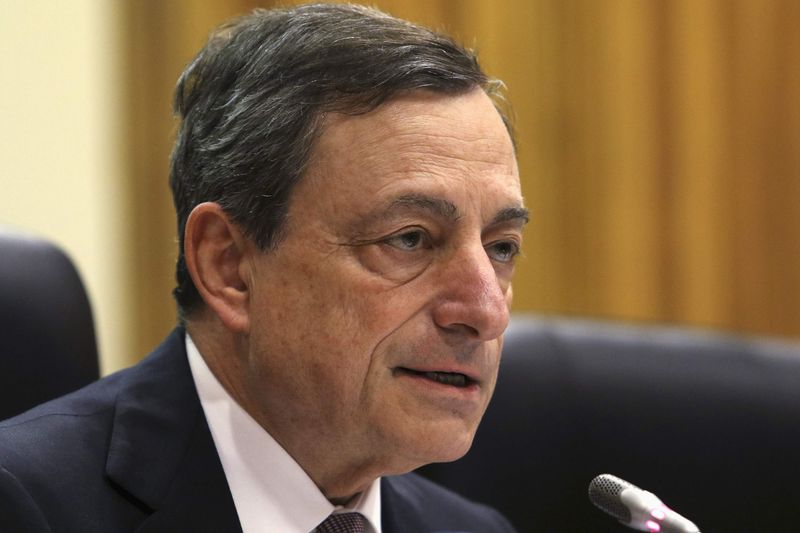By John O'Donnell and Angeliki Koutantou
NICOSIA/ATHENS (Reuters) - The European Central Bank will resume normal lending to Greek banks only when it sees Athens is complying with its bailout programme and is on track to receive a favourable review, ECB President Mario Draghi said on Thursday.
He also made clear the euro zone bank would not raise a limit on Athens' issuance of short-term debt to help leftist Prime Minister Alexis Tsipras avert a funding crunch, since the EU treaty barred monetary financing of governments.
The tough line, spelled out after the ECB's policymaking Governing Council met in Cyprus, added to pressure on Greece's radical new rulers to implement promised reforms under a bailout they had vowed to scrap but were forced to extend for four months to avoid running out of money.
"The ECB is a rule-based institution. It is not a political institution," Draghi told a news conference in Nicosia.
"The ECB is the first to wish to re-start the financing to the Greek economy provided the conditions are in place, and the conditions are that a process which suggests a successful completion of the review be put in place quickly. That is the condition and we will certainly welcome such a development."
The required measures include pension reform, privatisations and a streamlining of value added tax to which Tsipras' hard left Syriza party is bitterly opposed.
The troubled sell-off of state assets suffered another blow on Thursday when Greece's top administrative court blocked the sale of a luxury seaside resort outside Athens to an Arab-Turkish fund, court officials said.
The judges ruled the sale of the prime Astir Palace hotel complex and the development of the site breached planning rules and would harm the natural, cultural and urban environment.
Greek unemployment rose slightly to 26 percent in December, while jobless totals are falling in other euro zone countries that have been through bailout programmes such as Ireland, Spain and Portugal.
Draghi said the central bank had doubled lending to Greece to 100 billion euros in the last two months - equivalent to 68 percent of the heavily indebted country's economic output - but could not buy Greek bonds under its new asset-buying programme.
LIFELINE RAISED
The ECB increased the ceiling on emergency lending assistance for Greek banks, introduced last month when it stopped accepting Greek government bonds as collateral for funds, by 500 million euros to nearly 69 billion euros.
Draghi said the ECB could only go on authorising this liquidity line as long as the banks were solvent with adequate capital, which remained the case despite massive capital outflows in the last two months due to political uncertainty.
The ECB had asked euro zone members keep a 10 billion euro recapitalisation fund on standby "to face any sudden negative contingency that might materialise now", he said.
Finance Minister Yanis Varoufakis reached a deal with the euro zone, the ECB and the International Monetary Fund last week on a four-month extension of a 240 billion euro financial rescue which had been due to expire at the end of February.
However, the creditors have blocked avenues suggested by Athens for temporary state funding in a drive to ensure Greece complies with the deal before any more aid is released.

With tax revenues falling, Varoufakis is trying to scrape together cash from government reserves and state pension and health funds to meet a crucial repayment to the IMF this month.